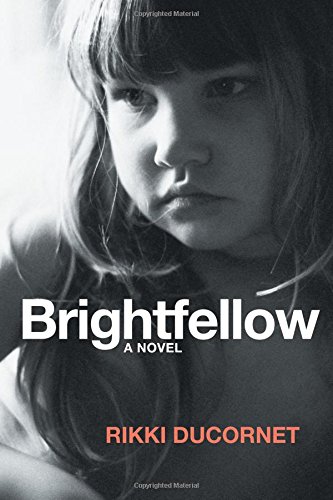reviewsThe New York Times, John Williams:
"Stub, the boy introduced at the beginning of Rikki Ducornet’s dark, elliptical fairy tale of a novel, is “a good child, far too good for his own safety.” He “doesn’t know he’s lonely and that his fear is not of his making, that it will haunt him for the rest of his life.” His live-in babysitter and his troubled mother both leave the family abruptly when he’s a child, and his father is eventually “conquered by his frayed nerves.” As a teenager, Stub ends up living as a reclusive vagrant at the nearby college where his father had worked in maintenance, hiding out in the library and a biology lab. He doggedly researches the eccentric work of an artist and writer named Verner Vanderloon, and becomes enchanted with a local 8-year-old girl named Asthma. There are obvious echoes of “Lolita” in Stub’s obsession with Asthma: “A name that is soft on the tongue, that, like cotton candy, dissolves. My own fairy child,” he says at one point. And later: “Go in peace, my little bell, my little snail, my little seaside pail; Asthma the salt, the surf of my soul.” But despite the creepy tension, his interest in her is ultimately presented as a longing for the foreclosed possibilities of his own lost childhood. He befriends and moves in with a lonely professor who mistakenly believes that Stub is a Fulbright scholar at the school. More for fans of atmosphere than fans of plot, Ms. Ducornet’s novel about a man who “cannot fathom the bottomless secret of his own existence” casts a lingering spell." "[a] dark, elliptical fairy tale of a novel..." |
Numéro Cinq, Jason DeYoung:
Brightfellow combusts with beautiful words and sentences. It builds a narrative that burns clean to reveal the complexity of our self-made identities and misplaced desires.
Read more...
PowellsBooks.Blog, Rikki Ducornet:
Brightfellow is the second novel in a trilogy devoted to betrayal (Netsuke is the first). If not exactly autobiographical, it takes place within an extended reverie of the Bard College campus where I grew up and where my father taught social philosophy. Born in Havana, his intellectual life was expansive, sparked as much by José Martí as Marcuse and Laotse. When I was just a little kid he gave me, along with so much else, Hendrik van Loon’s Ancient Man to read; a fantasy version of van Loon appears in the novel.
Read more...
The Millions, Madeleine Monson-Rosen:
Late in Brightfellow, Rikki Ducornet’s new novel, the protagonist and titular “fellow” takes two eight-year-old girls to see Rear Window. Unsurprisingly, for those readers familiar with Ducornet, the impropriety of this outing is never discussed. Rather, the children are more upset by Jimmy Stewart’s nipples than Raymond Burr’s murder and dismemberment of his wife, “Men should not have nipples!” they insist, “no one should have nipples!”
Read more...
Largehearted Boy, Book Notes - Rikki Ducornet "Brightfellow"
Cleaver Magazine, Elizabeth Mosier
But in Ducornet’s insightful, lyrical novel, it’s a different—and odd and wonderful—story...Brightfellow assumes that play is essential to all human development, and offers an artist’s take on the standard, self-serving argument. Informed by her interest in zoology, Ducornet understands the scientific basis in animal studies for the idea that play is hard-wired in humans.
Read more...
Between the Covers (radio interview) with David Naimon
The Los Angeles Times, Dustin Illingworth:
Rikki Ducornet’s ninth novel, “Brightfellow,” is of a piece with this tradition, albeit obliquely. If it is emphatically a novel for adults — a deceptively radiant howl of pain — the froth and sparkle of its prose bear the stamp of wonder one recalls from Roald Dahl, from Lewis Carroll, from Shel Silverstein.
Read more...
Brightfellow combusts with beautiful words and sentences. It builds a narrative that burns clean to reveal the complexity of our self-made identities and misplaced desires.
Read more...
PowellsBooks.Blog, Rikki Ducornet:
Brightfellow is the second novel in a trilogy devoted to betrayal (Netsuke is the first). If not exactly autobiographical, it takes place within an extended reverie of the Bard College campus where I grew up and where my father taught social philosophy. Born in Havana, his intellectual life was expansive, sparked as much by José Martí as Marcuse and Laotse. When I was just a little kid he gave me, along with so much else, Hendrik van Loon’s Ancient Man to read; a fantasy version of van Loon appears in the novel.
Read more...
The Millions, Madeleine Monson-Rosen:
Late in Brightfellow, Rikki Ducornet’s new novel, the protagonist and titular “fellow” takes two eight-year-old girls to see Rear Window. Unsurprisingly, for those readers familiar with Ducornet, the impropriety of this outing is never discussed. Rather, the children are more upset by Jimmy Stewart’s nipples than Raymond Burr’s murder and dismemberment of his wife, “Men should not have nipples!” they insist, “no one should have nipples!”
Read more...
Largehearted Boy, Book Notes - Rikki Ducornet "Brightfellow"
Cleaver Magazine, Elizabeth Mosier
But in Ducornet’s insightful, lyrical novel, it’s a different—and odd and wonderful—story...Brightfellow assumes that play is essential to all human development, and offers an artist’s take on the standard, self-serving argument. Informed by her interest in zoology, Ducornet understands the scientific basis in animal studies for the idea that play is hard-wired in humans.
Read more...
Between the Covers (radio interview) with David Naimon
The Los Angeles Times, Dustin Illingworth:
Rikki Ducornet’s ninth novel, “Brightfellow,” is of a piece with this tradition, albeit obliquely. If it is emphatically a novel for adults — a deceptively radiant howl of pain — the froth and sparkle of its prose bear the stamp of wonder one recalls from Roald Dahl, from Lewis Carroll, from Shel Silverstein.
Read more...

